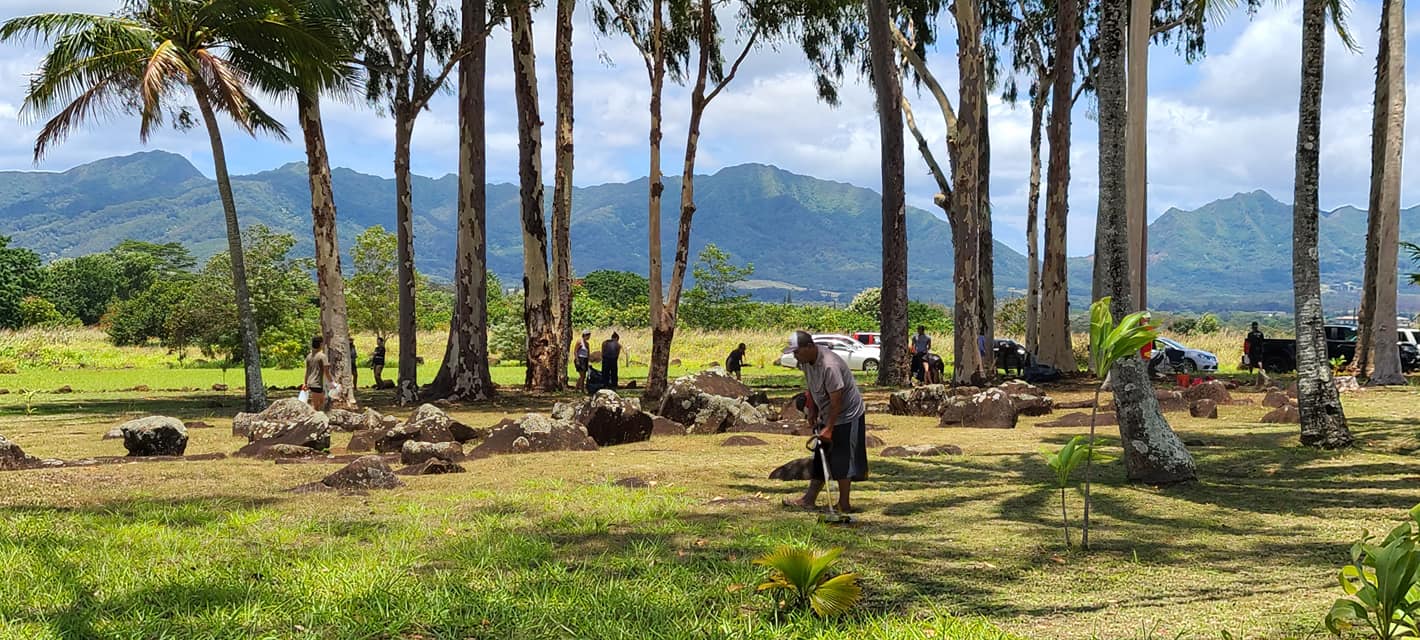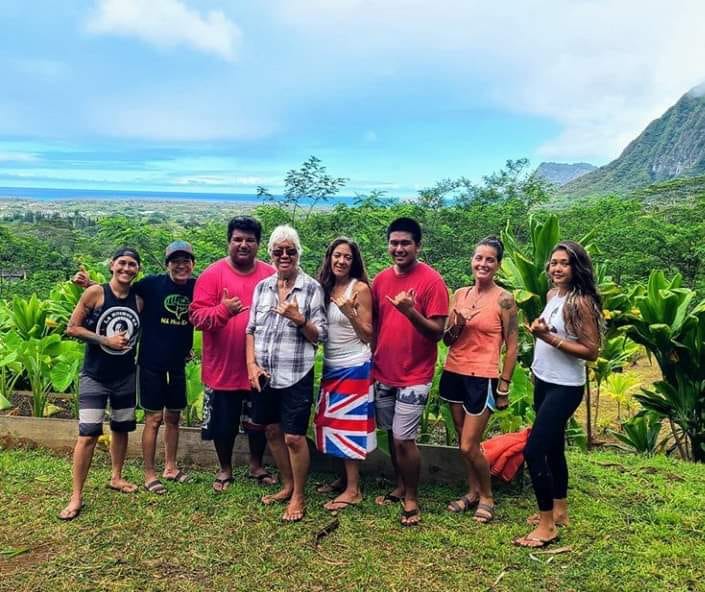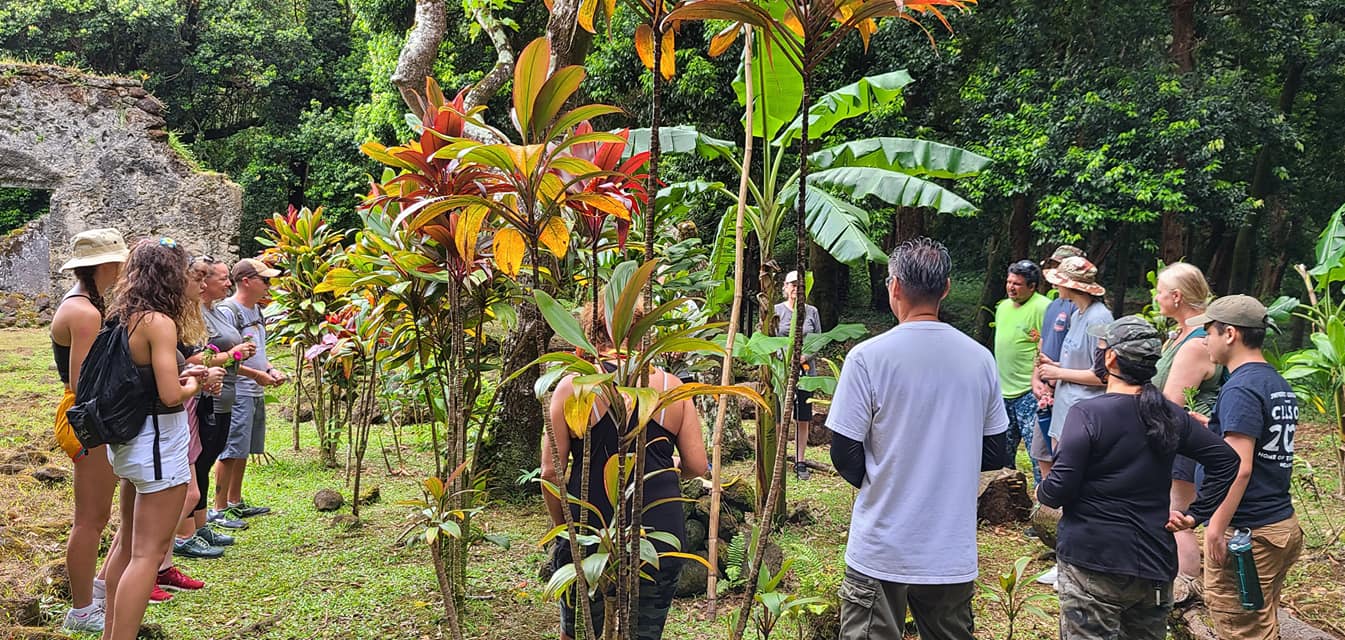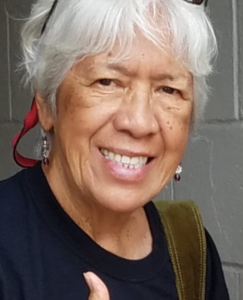 Educator and advocate Lynette Hi‘ilani Cruz, PhD was born in Hilo and grew up on O‘ahu, eventually settling in Wai‘anae. She holds a PhD in Anthropology.
Educator and advocate Lynette Hi‘ilani Cruz, PhD was born in Hilo and grew up on O‘ahu, eventually settling in Wai‘anae. She holds a PhD in Anthropology.
For most of her adult life, Cruz has been a strong and effective advocate for the preservation and maintenance of ancient Hawaiian historic places. During her years as a professor of cultural anthropology at Hawai‘i Pacific University, she has inspired hundreds of students to volunteer and mālama historic sites primarily on the island of O‘ahu. By promoting place-based learning, Cruz encourages students to put into practice what they learn in the classroom. Since her retirement from HPU, she continues these efforts as a professor at Leeward Community College Wai‘anae. She also maintains her advocacy work via Hui Aloha ‘Āina o Ka Lei Maile Ali‘i, an organization which she formed to involve people in cultural service work and learning in honor of Queen Lili‘uokalani.
After years of practice, Cruz has established relationships with a considerable number of caretakers and supporters. Under her leadership, volunteers have completed restoration or rehabilitation work at dozens of sites, including: Hālawa Valley, Ho‘oulu ‘Āina (Kalihi), Huilua Fishpond (Kahana), lo‘i kalo in Ka‘ala, Kanehekili Heiau (Haiku), Kanewai loko i‘a (Kuli‘ou‘ou), Mākua Valley, Ulupō Heiau (Kailua), Kaniakapūpū (Nu‘uanu), and many others.
“Lynette has been a tireless voice of na kūpuna kahiko (the ancestors), teaching others about the value of these wahi pana and wahi kapu (famous and sacred places) as well as introducing and connecting them to modern historical events,” says fellow advocate Mahealani Cypher. “Her strong heart and love for history has nurtured and inspired many to follow in her footsteps to support and preserve the history of our ancestors.”
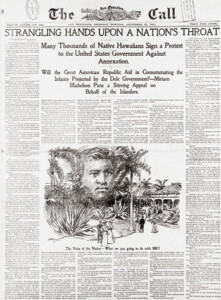
This 1897 article by Miriam Michelson inspired the re-enactment “Ka Lei Maile Ali‘i”.
Also among her achievements in historic preservation education, Cruz produced “Ka Lei Maile Ali‘i (The Queen’s Women),” a historical re-enactment of a September 16, 1897 meeting in Hilo attended by over 300 Hawaiians. Speaking there were Mrs. Abigail Kuaihelani Campbell and Mrs. Emma Aima Nawahi, who had collected the signatures of more than 38,000 Native Hawaiians—97 percent of the native population—in a kū‘ē (to stand in opposition) petition to oppose the U.S. annexation of the Hawaiian Kingdom. After learning about the meeting in an 1897 news article “Strangling Hands Upon a Nation’s Throat,” Cruz asked a friend, Helen Lee Kwai, to write a play based on it, resulting in “Ka Lei Maile Ali‘i”. Since its debut in 2001, the re-enactment has been performed over 100 times.
Personal events and experiences over 30 years ago led Cruz towards her current path of caring for ‘āina and kūpuna, a path which she pursues admirably with wholehearted conviction. Witnessing a disparate number of Hawaiians becoming displaced and houseless, she was motivated to pursue a graduate degree as a means of advocacy and developing influence.
“I’m not an academic. I don’t even consider myself a scholar,” she says. “I am an activist who went to school. I’m an activist who thought about how I might get people pay attention to me…I found that having credentials matters. I can stick up for others.”
In addition to a connection with cultural identity, Cruz seeks to engage young people with ancient lo‘i kalo (fields of taro) and loko i‘a (fishponds) in order to support development of a more sustainable way of life to modern alternatives. By reconnecting people with the ‘āina, Cruz envisions a more equitable future.
“In my view, caring for ‘āina and kūpuna is a form of resistance. We often have to either ask permission to do the job that government is supposed to do, or we do the work without asking permission. Either way, the work gets done and ‘āina and kūpuna are cared for.”
– Lynette Cruz
Lynette Cruz is the recipient of a 2021 Preservation Honor Award in Individual Achievement. To learn more about her advocacy work, please visit her Facebook page at: https://www.facebook.com/lynette.cruz2.
Editor’s note: Mahealani Cypher contributed a significant portion of this article.


